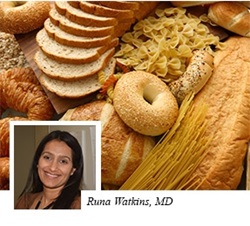Dr. Runa Watkins Answers Common Celiac Disease Questions

What's the biggest myth about celiac disease?
I think one of the biggest myths is that people believe you are "allergic" to wheat when you have Celiac Disease. The fact is, Celiac Disease is an autoimmune disease, not an allergy. Yes, you are unable to eat wheat, barley, rye, malt, but it is because your body develops antibodies specifically to your small intestine.
What would people be surprised to know about celiac disease?
I think people would be surprised to know that while the most common symptoms of Celiac Disease are GI related, people who are asymptomatic can also be diagnosed. This is often seen in first degree relatives of patients, who has clinically well, but have positive antibodies and biopsies. This phenomenon is why screening of all first degree relatives is recommended.
What are the main differences between celiac disease and gluten sensitivity?
Unfortunately, there are a lot of unanswered questions in gluten sensitivity. The main difference is that in Celiac Disease, you have development of antibodies with the ingestion of gluten in a genetically susceptible individual. In gluten sensitivity, there is no development of autoantibodies, though symptoms may be similar. Gluten sensitivity should be considered only when Celiac Disease has been properly ruled out.
Celiac disease has become a widely understood condition only in the past decade or so, but University of Maryland Medical Center has been on the forefront of diagnosing and caring for celiac patients for nearly 20 years, with one of the only dedicated celiac and gluten related disorders practices in the Baltimore-DC region.
Runa Watkins, M.D., and Samra Blanchard, M.D., co-direct the UMMC Celiac program, offered every Tuesday at UMMC's satellite office in Hanover, Anne Arundel County. About 15 patients of all ages in various stages of celiac treatment, from diagnosis to maintenance care, come through the doors each week to a team consisting of Drs. Watkins and Blanchard, who are both gastroenterologists; a nurse; a research nurse; and a dietician who concentrates solely on gluten-related disorders.
Celiac disease can strike at any age and at the University of Maryland, patients present with varying symptoms due to inflammation in the intestinal lining as a reaction to consuming gluten. Gluten is a protein contained in wheat, rye and barley and may be a hidden ingredient in many foods, beverages and other products.
"I do think because we have one of the only dedicated celiac clinics in the area, there's been more awareness and a lot more patients," says Dr. Watkins, a pediatric gastroenterologist at the University of Maryland Children's Hospital and assistant professor of pediatrics at the University of Maryland School of Medicine.
"Our dietician has been doing this for 20-plus years," she adds, "and has seen the progression of people not knowing what celiac disease is, to knowing what a gluten-free diet is, to gluten-free being a fad in Hollywood, to people being able to go to grocery stores and restaurants and find gluten-free foods almost anywhere."
Celiac Poses Serious Consequences
An estimated 1 in 133 Americans, or 1% of the population, has celiac disease. But symptoms aren't the same for all: Some experience gastrointestinal difficulties such as abdominal pain, gas or constipation; others may suffer with "brain fog," headaches, rashes or joint pain. Children with celiac disease may be shorter than normal or unable to gain sufficient weight. That's due to damage to intestinal villi, which normally help absorb nutrients from food.
Blood work is the first step to diagnosing celiac disease definitively, but the gold standard test is considered to be a biopsy of the small intestine performed during an endoscopy.
"It's really necessary for establishing the initial histology, and we then repeat it in a year to document mucosal healing," explains Dr. Blanchard, director of pediatric gastroenterology and hepatology at the UM Children's Hospital and an associate professor of pediatrics at the University of Maryland School of Medicine.
Patients' quality of life is certainly affected by the disorder, depending on the severity of celiac symptoms. But perhaps even more important, if patients' intestinal mucosa do not heal properly, patients are left open to a variety of serious, long-term risks, including developing malnutrition, vitamin deficiencies, low bone density, infertility or intestinal lymphoma, a form of cancer.
Detailed Diet Assistance
Celiac disease has no cure, but the condition can be controlled by cutting out all gluten consumption. Fortunately, this task has gotten far easier over the past decade with ample access to gluten-free foods in grocery stores, restaurants and other food establishments. UMMC's dedicated celiac dietician also guides patients in detail to help them prevent cross-contamination of their foods with gluten-containing foods, Dr. Blanchard notes.
The celiac program also treats patients with gluten allergy or sensitivity, who do not suffer intestinal damage from consuming gluten but nonetheless experience uncomfortable symptoms and feel better by abstaining. Additionally, the clinic works with some children with autism spectrum disorder to gauge any benefits to them from altering their dietary approach.
Celiac patients are seen at regular intervals, with ready access to staff members by phone or email. Referring physicians receive faxed reports to keep them apprised of patients' celiac care, and anyone can email with questions at pedsgi@peds.umaryland.edu.
"Most patients come to us through word-of-mouth," Dr. Blanchard says. "Our visits last 60 to 90 minutes because we go over their diet in detail. Most gastroenterologists are not able to spend this kind of time with patients, so patients are getting more personalized service here."
This article is a part of University of Maryland Rounds, which features clinical and research updates from the University of Maryland School of Medicine and University of Maryland Medical Center. See more Rounds articles.
Appointments can be scheduled by calling 410-328-6749.
